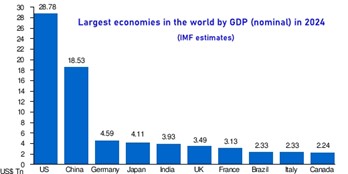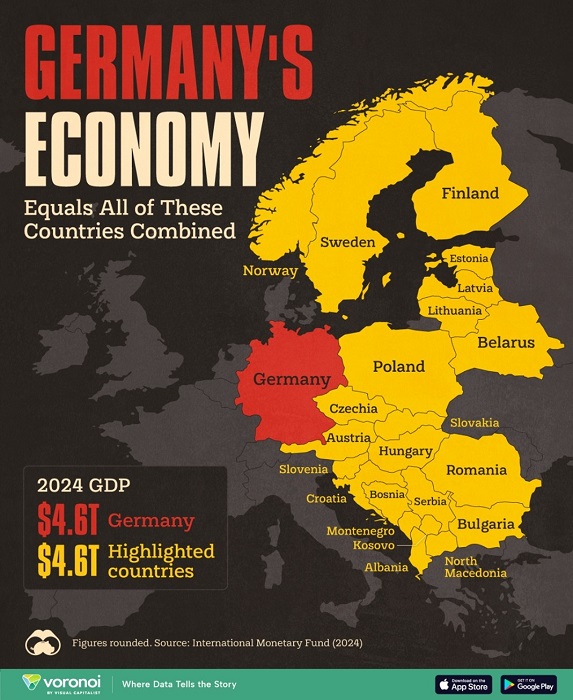Tariq Saeedi
Germany is the economic powerhouse of Europe. It is the third largest economy in the world.
The size of the German economy is simply impressive considering that it has always paid a heavy price for the broader cooperation in Europe. Germany also has an impeccable record of fulfilling its commitments. The roots are in the national psyche where the sense of moral obligation looms large.
The copyright to the above infographic belongs to the Visual Capitalist.
Here is the accompanying write-up from the website of the Visual Capitalist:
The $4.6 trillion German economy is the largest in Europe and the third-largest globally. But how does this compare in simpler terms?
In this map we visualize how Germany’s economy stacks up against the combined GDP of 22 other European countries using current prices. Data is sourced from the International Monetary Fund (IMF) via their latest economic projections for 2024.
Germany vs. Half of Europe
Draw an imaginary box from Germany’s eastern border to Russia’s western border, and from Finland up north to Albania down south. All the countries in this box together would equal Germany’s economy.
This bloc of countries has a combined population of 157 million people, almost twice the size of the 85-million strong German population.
Like most developed markets, the German economy is dominated by the services sector. But its industrial prowess is no slouch either. The country is known for manufacturing cars and medicines, mostly for export to the U.S. and the rest of Europe.
For the latest assessment on the German economy, let us turn to KPMG. As we know, KPMG International Limited is a British multinational professional services network, and one of the Big Four accounting organizations, along with Ernst & Young, Deloitte, and PwC.
Here is the take of MPMG:
Economic Key Facts Germany as of September 2024
With a Gross Domestic Product (GDP) of 4.121 billion Euros in 2023, Germany is the third-largest economy in the world after the United States and China, making it Europe’s largest economy. It is the exports of motor vehicles and parts as well as chemical products that have strengthened Germany up to become the third-largest exporting nation in the world. With a 70% share of the GDP, the service sector contributes by far the largest share of the country’s economy.
In addition, Germany is a top destination for investors, attracting an ever increasing number of companies to make greenfield investment there. As the largest economy in Europe, Germany entices its investors with its central-european location, but simultaneously puts them off with the current deterioration of Germany’s situation as an economic destination.
German Exports Rise in July 2024
German companies exported more goods in July 2024. Exports were 1.7% higher than in the previous month, June 2024. Previously, exports had declined for two consecutive months. Compared to July 2023, however, exports fell by 1.2%.
Imports into Germany saw a stronger increase, rising by 5.4% compared to the previous month. As a result, the trade surplus in July 2024 amounted to 16.8 billion euros, down from 20.4 billion euros in June. This is the lowest figure since May 2023.
German exporters experienced particularly sharp declines in China (-8.0% compared to the previous month). Exports to the USA also fell (-1.7%). Within the EU, however, German exports rose by 3.3%.
A glimmer of hope comes from industrial orders. Incoming orders in the manufacturing sector increased by 3.7% in July 2024 compared to July 2023. They also showed a month-on-month increase of 2.9% compared to June 2024. The positive development in manufacturing orders in July 2024 is mainly due to a significant rise in the “other vehicle construction” sector (aircraft, ships, trains, military vehicles), where new orders were 86.5% higher than the previous month due to several large orders.
Inflation Rate Falls Below Two Percent in August 2024
Germany’s inflation rate dropped significantly in August 2024. Consumer prices rose by only 1.9%, the lowest increase in about three and a half years. In July, the inflation rate had climbed to 2.3%, up from 2.2% in June. Economists attribute the decline mainly to lower energy prices compared to the previous year.
Additionally, the number of companies planning price increases in the coming months decreased in August 2024. The ifo Institute’s price expectations barometer fell to 16.3 points (July 2024: 17.6 points). This drop was mainly driven by industry and business-related service providers. In contrast, slightly more companies in consumer-related sectors and the construction industry plan to raise prices compared to the previous month.
The points indicate the net percentage of companies (percentage planning price cuts minus percentage planning price increases) intending to raise prices. A balance of +100 points would mean all companies plan to raise prices, while -100 points would indicate that all plan to lower them.
Current forecasts from German economic research institutes and government organizations suggest that the inflation rate will remain steady at roughly the current level. Projections for the 2024 fiscal year range between +2.2% and +2.7%.
* * *
Germany has its own way of doing things, which sometimes resembles the others and sometimes does not. There are many ways to explain this and among them is the fact that the moral compass is always functioning correctly in Germany.
German Chancellor Olaf Scholz participated on 17 September 2024, in the second Germany-Central Asia Summit held in Kazakhstan. His three-day visit to the region commenced in Uzbekistan, followed by engagements in Kazakhstan, where he also held meetings with the leaders of Turkmenistan, Kyrgyzstan, and Tajikistan.
Dr Mehmet Fatih Oztarsu has written an analytical piece for CACI on the outcome of the Germany-Central Asia Summit.
Dr Oztarsu is the Assistant Professor at Joongbu University and Senior Researcher at the Institute of EU Studies at Hankuk University of Foreign Studies. He studied and worked in Baku, Yerevan, Tbilisi, and Seoul as academic and journalist. He is the author of numerous articles and books on South Caucasus and Central Asian affairs.
Central Asia – Caucasus Analyst (CACI) is a publication of the Central Asia – Caucasus Institute and Silk Road Studies Program Center.
While we at nCa do not agree with the views of Dr Oztarsu in their entirety, here are some passages from his article titled ‘Germany’s Reliable Partnership Challenge in Central Asia.’
It was published on 3 October 2024.
A deeply abridged version of the article of Dr Oztarsu:
Germany’s interest in Central Asia has significantly increased in recent years, as evidenced by a series of high-level visits and diplomatic initiatives. In 2023, German President Frank-Walter Steinmeier visited Kazakhstan and Kyrgyzstan, followed by the inaugural Germany-Central Asia Summit.
These engagements have consistently emphasized the importance of strengthening ties with the region, with particular focus on Kazakhstan. With a trade volume of $4 billion, Kazakhstan plays a crucial role for Germany and is viewed as a strategic country within the Middle Corridor. Uzbekistan has recently begun to draw attention as well.
The decision to deepen relations with the Central Asian republics represents a significant development during this period. The growing consensus that Germany must adopt a more active role in the region than it has in the past is shaping the current government’s strategic approach.
The German-Central Asian Summit and the recent strengthening of ties with the region have emerged as key developments in recent years. The second summit took place at a time when Chancellor Scholz indicated a more proactive approach toward Central Asia.
Germany now stands at a critical juncture, facing important decisions regarding its role in Central Asia. The country has the opportunity to establish a solid presence in the region by adopting a win-win strategy, leveraging its technical expertise, and fostering collaborative relationships with Central Asian countries.
The way Central Asian republics perceive the notion of “trustworthy partners” will become clearer over time as these dynamics unfold.
It would be more prudent for Germany to align its policies with the expectations of the Central Asian republics. Rather than taking a top-down approach, policies should be crafted on an equal footing, emphasizing mutual respect and shared interests to ensure a sustainable and constructive partnership.
* * *
The CA-Germany summit took place at a historic junction in time. The ground reality now is that Central Asia is nobody’s playground or a potential zone of influence, up for grabs.
The region is the geo-economic centre of the Eurasian landmass. There is plenty of space for the economic partnership in all directions based on equality, mutual respect and mutual benefit.
‘Influence’ is a word that immediately acts as a trigger in this region. Instead of ‘influence’ it is highly laudable to use the term ‘partnership.’ Therefore, the focus should be on straightforward partnership, not in the context of increasing or decreasing someone else’s ‘influence.’
Germany understands this region better than many. We are confident that CA-Germany summit would serve as the multiplier for the economic partnership.
We also believe that Germany is a natural partner for Central Asia. /// nCa, 10 October 2024

